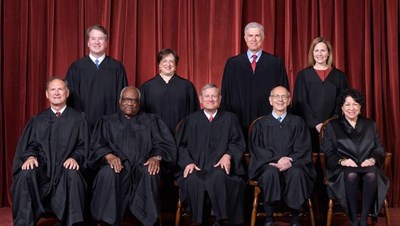
The U.S. Supreme Court’s rumored Dobbs decision would reverse Roe v. Wade and related cases, leaving it to individual states to regulate abortion at any stage of pregnancy. In the midst of a referendum in Vermont over Proposal 5 (which would constitutionally ensure a right to abortion up until delivery), this dramatic federal legal vaccuum presents disturbing implications.
Roe premised the right to an abortion on what is called “Substantive Due Process,” a controversial evolution in U.S. Constitutional law that sought to shield traditional rights not specifically mentioned in the Constitution. The opinion currently being distributed as the forthcoming majority position of the Dobbs Court revisits Roe, proclaiming the right to an abortion does not fit that test:
Until the latter part of the 20th century, there was no support in American law for a constitutional right to obtain an abortion. Zero. None. No state constitutional provision had recognized such a right. Until a few years before Roe was handed down, no federal or state court had recognized such a right. Nor had any scholarly treatise of which we are aware. ….Not only was there no support for such a constitutional right until shortly before Roe, but abortion had long been a crime in every single State. (p. 15).
This draft appears to be legitimate, in which case the result will be to leave the regulation of abortions to state governance. Roe always was a sort of jurisprudential version of King Solomon’s famous baby-division: by dividing gestation into stages and wedging that analysis into federal law as a “right,” the Roe Court imposed a national uniformity that will be shattered overnight if Dobbs rules as anticipated. The Dobbs Court specifically condemns the Roe Court for overreaching, but the abortion landscape that lays ahead reveals what Roe sought to avoid.
Roe’s repeal will not change Vermont’s liberal abortion laws – though it will allow conservative states to ban abortion from conception. Indeed, pro-life forces in Vermont may be disheartened – at least Roe had recognized viability and fetal personhood, and the legitimate state interest in protecting those children. That glimmer of protection, which could well have been expanded in Dobbs using modern science, has now evaporated.
Vermont’s abortion dispute remains a moral one. The great horror of Proposal 5 is not that it protects abortion procedures (which are already protected under clear laws), but that it seeks to protect later-term abortions that could include viable human babies. If proponents of Proposal 5 wished to assure Vermonters that was not the case, clear language could be incorporated – but the opposite is the case.
For years, Vermont pro-choice positions have been frighteningly severe in their near-reverence for that controversial “procedure,” so much so that repeated efforts to recognize fetal personhood in criminal law have been thwarted. This means that if a man brutally assaults a woman (domestic partner?) and causes her late-term child to perish, or a drugged driver destroys a fetus in an innocent victim’s womb, Vermont law provides absolutely no criminal penalty. This is hardly the balance toward which Roe strove, and it is the opposite side of the spectrum from those who would ban abortion from conception.
But now the game has changed overnight – if southern states ban all abortions outright, and neighboring states prohibit late-term terminations, Vermont will be a destination for a new kind of tourist.
A large majority of Vermonters oppose late-term abortions. Proposal 5 is deliberately broad, and also extends to protect minor children’s decisions to have abortions or obtain gender hormone change therapies without parental consent. Without a clear and workable constitutional amendment for consideration by voters, Proposal 5 as drafted is extremist and suspect, and does not belong in the Vermont State Constitution….
….whatever the United States Supreme Court decides.